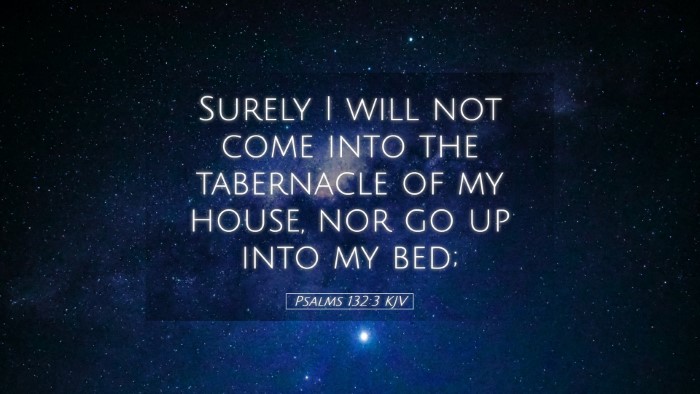Bible Commentary on Psalms 132:3
Verse: "Surely I will not enter my house, nor go up to my bed; I will not give sleep to mine eyes, or slumber to mine eyelids." (Psalms 132:3)
Introduction
The verse from Psalms 132 touches upon the commitment and zeal of the psalmist, reflecting a deep yearning for God's presence and the establishment of His dwelling place. This passage, rich in theological and practical implications, provides a profound insight into the heart of a servant of God who understands the significance of divine habitation among His people.
Theological Insights
In this verse, we see the psalmist's intense dedication to God’s kingdom and the acknowledgment of the importance of worship and the sanctuary. The declaration of resoluteness illustrates a common theme throughout the Psalms—the longing for divine fellowship.
Matthew Henry's Commentary
Matthew Henry emphasizes the urgency and seriousness of the psalmist's vow. He observes that the psalmist is willing to sacrifice his personal comfort for the sake of seeking God. According to Henry, this passion for God’s dwelling is indicative of a heartfelt desire to prioritize spiritual pursuits over earthly pleasures.
- Reflection on Sleep: Henry notes that the act of forgoing sleep symbolizes the extent of the psalmist's commitment. It represents an allegorical sleeplessness in the pursuit of God's habitation.
- Application: For contemporary believers, this verse serves as a reminder to prioritize spiritual devotion over worldly distractions. It calls us to evaluate our own commitment to seeking the presence of God in our lives.
Albert Barnes' Notes
Albert Barnes provides a more contextual interpretation, considering the historical and cultural significance of Zion as the chosen dwelling place of God. Barnes highlights that this prayerful expression reflects a national and communal longing among the Israelites.
- Sacredness of Zion: Barnes explains that Zion represents a place set apart for divine worship, and the psalmist's unwillingness to find rest until God is honored illustrates a deep spiritual concern.
- Collective Responsibility: The verse underscores a communal aspect of faith; it's not just the individual but all of Israel shares in the yearning for God's presence.
Adam Clarke's Commentary
Adam Clarke underscores the personal resolve depicted in this prayer. He reflects on the spiritual insignificance of earthly comforts when compared to the splendor of God's presence. Clarke notes that such expressions of fervor are vital for anyone desiring to see God glorified.
- Contextual Importance: Clarke suggests that the historical setting where David made this vow while seeking to bring the Ark of the Covenant to Jerusalem exemplifies the earnestness of holy zeal.
- Practical Implications: He challenges believers to emulate this zealous spirit, inviting them to seriously contemplate what measures they would take to experience deeper communion with God.
Practical Application
The implications of Psalms 132:3 stretch into our daily lives. Pastors, theologians, and students are challenged to examine their life priorities in light of their spiritual aspirations. The commitment expressed by the psalmist foregrounds essential disciplines every believer should aspire to cultivate:
- Communal Worship: The importance of gathering with fellow believers to seek the presence of God collectively is illuminated through this verse.
- Personal Commitment: Individual believers are encouraged to draw personal lines in the sand regarding their dedication to God and His house.
- Prayer and Fasting: Like the psalmist, we may benefit from periods of earnest prayer and fasting, reflecting our seriousness about God's presence.
Conclusion
Psalms 132:3 serves as an eloquent reminder of the profound urgency and dedication required in our pursuit of God. As interpreters of Scripture, we find in the psalmist a model for expressing an earnest desire for communion with the Creator. The insights drawn from various commentaries not only enrich our understanding of this verse but also challenge us to embody that earnest pursuit in our own lives. In an age filled with distractions, the heartfelt longing to see God’s presence manifest in our lives and congregations becomes increasingly vital.


